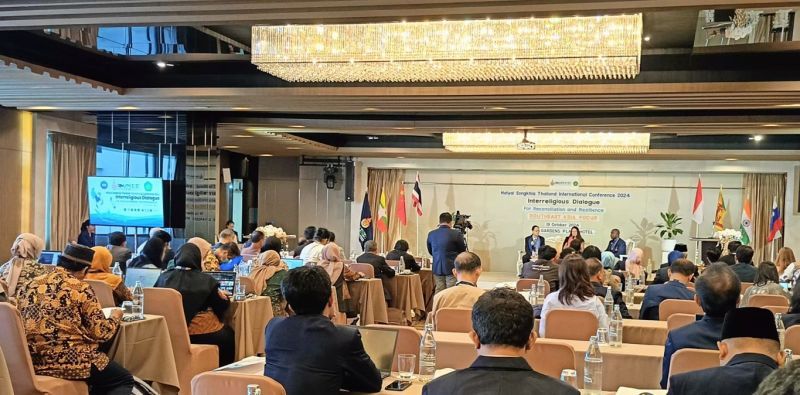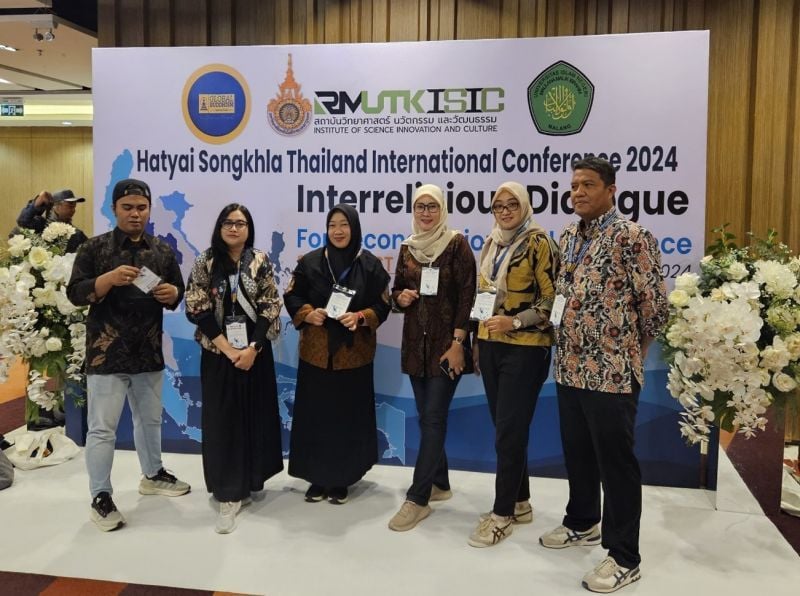
Conference atmosphere attended by a number of scientists from various countries.
Unesa.ac.id. SURABAYA—One of the teams from Surabaya State University (UNESA) was one of the Indonesian delegates at the international conference organized by the Institute of Science, Innovation and Culture-Rajamangala University Technology Krungthep and UIN Malang, on 19 October 2024.
The conference which took place in Hat Yai, Songkhla, Thailand was attended by scientists from various countries to address pressing issues with the theme 'InterReligious Dialogue for reconciliation and resilience: South Asia Focus.'
At the conference, the cross-section 'House of Champions' campus team from the Directorate of Educational Transformation and Learning Technology (DTPTP), invited discussions about how universities can play an important role in fighting the problems of polarization, echo chambers, and the risk of misinformation on social media platforms and promoting better interfaith dialogue.
The head of the research team, Ika Dyah Candra Arifah, who is also Head of the International Class Program Section emphasized the importance of understanding the potential threats posed by polarization, echo chamber, and misinformation in today's digital world.
"Social media offers incredible opportunities for interaction, but it is important that we also address the risks that come with it, especially in inter-religious conversations, " he said.

One of the UNESA DTPTP Team in the Hatyai Songkhla Thailand International Conference 2024.
Main aspects discussed at the conference This is one of the fundamental challenges, regarding how universities can utilize social media to promote peace and reduce risks such as polarization, echo chamber, and misinformation in inter-religious dialogue.
This team share strategies for utilizing social media responsibly, ensuring it serves as a bridge rather than a barrier and propose at least three key initiatives aimed at enabling universities to use social media as a positive force in inter-religious dialogue.
In this regard , Head of the International Class Program who is familiarly called Ika, underlined that the important role that universities can play in holding structured discussions with the main aim of providing a safe space for inter-religious dialogue is the main thing.
As a place that neutral, universities can offer safe spaces for students and community members to engage in constructive interfaith conversations, thereby reducing polarization. "Universities have a unique responsibility to foster inclusivity and understanding, which is very important in today's interconnected world," he stressed.
Furthermore, Ainur Rofik, Head of the DTPTP Digital Class Management Section added, that higher education institutions need to teach media literacy as part of their curriculum. By promoting media literacy in the curriculum, universities can empower students to explore the digital landscape responsibly.
Given that the use of social media in everyday life is inevitable, then It is hoped that using it creatively and positively can bridge gaps in inter-religious perspectives.
Furthermore, Irena Maureen recommended that universities not only enrich the curriculum with media literacy, but also encourage interdisciplinary research that bridges fields such as social sciences, technology, and religious perspectives.
“Such collaborative efforts can offer a holistic solution to the problem of polarization, providing a more comprehensive understanding of how to foster dialogue in the digital era. "In this way, the initiatives carried out are not only targeting the younger generation of students, but also the teachers," said the Head of the DTPTP International Learning Innovation Section.
The participation of the Unesa DTPTP Team in the conference not only highlights its commitment to global involvement but also shows the proactive attitude of universities in dealing with complex problems through educational transformation.
As universities around the world grapple with the implications of digital communications on social cohesion, the insights shared by the Unesa team offer an initiative to foster peace and unity in an increasingly connected world.
By engaging in international dialogue and conferences, DTPTP Unesa actively contributes to shaping future-ready education that equips students with the skills and awareness needed to navigate a complex digital society.
p>This international conference is proof of the role of education in fostering intercultural understanding and perspectives and is an example of how universities can strengthen their role in creating a more inclusive and connected global community.[*]
***
Author and photo: UNESA Delegation to Hatyai Songkhla Thailand International Conference 2024
Share It On:






